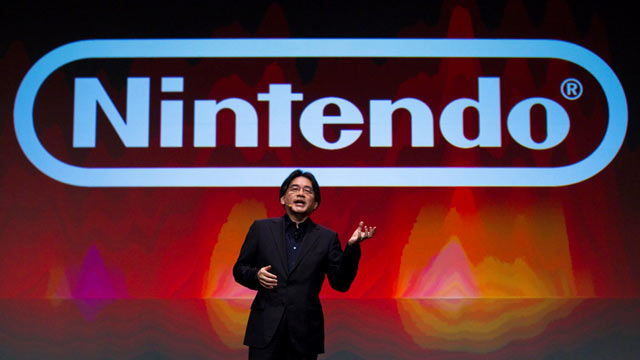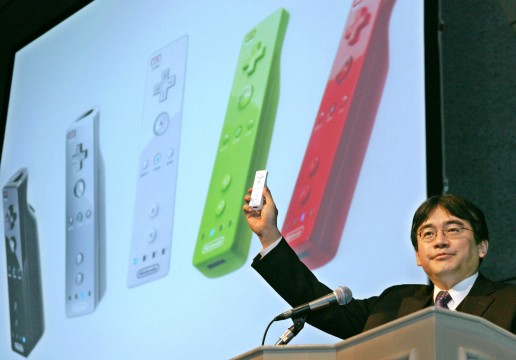
It wasn’t until Nintendo first started doing its Nintendo Direct broadcasts that I really began to take notice of company president Satoru Iwata. I was immediately taken by how different Iwata was from Shigeru Miyamoto and Reggie Fils-Aime. Where Reggie and Shigeru are bigger than life, Iwata was more of an everyman. Quiet and soft-spoken, he addressed fans almost timidly at first. After all, who’d ever heard of such a thing as a company president recording himself to talk about upcoming product releases? Yet, as many of Nintendo’s endeavors often do, it worked brilliantly even if it probably shouldn’t have, and Iwata grew more and more comfortable in his role. Choosing Iwata to be the one to come out every few months to chat with fans via the Internet was brilliant because he was so unpretentious. Watch enough E3 conferences and all too often the stage is taken by corporate automatons who know more about spreadsheets and profits than actually playing video games. Iwata was different. He never came across as insincere, or as though someone was forcing him to do what he was doing. It genuinely felt like he was a guy who took his responsibilities seriously, with one of those responsibilities just so happening to be giving fans good games to play.
Another reason Iwata was the perfect person to talk about Nintendo’s games was because back in the day, he actually made them. Balloon Fight, EarthBound, Kirby’s Adventure, and many more besides all had the man’s fingerprints on them. Nintendo has only ever had four company presidents since its founding. Of the four, Iwata was the sole one to be pulled into the position who wasn’t related by blood to the original founder, Fusajiro Yamauchi. I’ve been thinking about that over the last couple of days, and how profound that is. Nintendo is a company rich with history. It’s also not a Western company. Human beings all live and breath on the same planet, but different parts of the world have different beliefs, customs, and morals. Nintendo, from its games to the ways it operates, is fundamentally Japanese. For people not from the country, the quirkiness and elements of the company that are so endearing to them often stem from these cultural differences. Nintendo’s various business practices and decisions, on the other hand, can also make it appear obstinate from the outside (though there’s undoubtedly some truth to that). At its core, however, Nintendo’s direction is predicated by a respect for tradition. When Hiroshi Yamauchi (the third president of the company) stepped down, the decision to have Iwata replace him wasn’t taken lightly, nor was it without a considerable amount of pressure, but the underlying, undeniable fact was that he was the perfect person for the job. Perfect, because he lived, breathed, and fundamentally understood Nintendo as both company and philosophy.

Nintendo flourished greatly under Iwata’s guidance as a result, first with Nintendo DS (which Yamauchi admittedly still had a hand in), but then especially with Wii. While Microsoft and Sony both locked horns much like Nintendo and Sega did back in the early nineties, Iwata walked the company down a different path. Clinging to the principles that have defined Nintendo for decades, Iwata trail-blazed where others simply played things safe. Nintendo was a game company, and in Iwata’s mind that is what it would always be, until the bitter end. Even when he finally acquiesced to the demands of a smartphone-obsessed world by deciding to bring Nintendo properties to mobile, it wasn’t without extreme calculation and the intent of keeping the company’s traditions intact. Think about that for a minute. It’s pretty difficult to imagine any other company’s president or CEO making decisions with concern for upholding tradition the way Iwata did. He even took a pay cut when Nintendo’s profits were dwindling, for crying out loud. I can’t say definitively how sincere all of these actions were, but as an outsider looking in it always struck a chord with me. Nintendo isn’t a perfect company, and I’m sure Iwata wasn’t a perfect person, but if nothing else, under his watch I always felt like I wasn’t purely a cash cow. I have my problems with Nintendo, but Iwata seemed to honestly be trying his best with every choice he made, taking the edge off of some of the sting when the company would err.
Now he’s gone. No warning, nothing, just some bad news on a Sunday out of the blue. It’s hard to process. The Nintendo Direct broadcasts have become such a huge part of Nintendo’s mystique that I can’t see the company ever not doing them, but what in the world will they be like without Iwata? Like I said earlier, he was my point of entry. He felt like a normal guy who just happened to be running my favorite video game company. I don’t doubt Nintendo will find another winning formula without him, but whoever takes over, both as frontman and president of the company, is going to have some big shoes to fill. I did take some comfort in reading Miyamoto’s statement about Iwata’s passing, where he noted that his friend would have wanted him and everyone else at Nintendo to carry on making incredible games for people to play. It speaks to the dedication he and everyone else at the company has to their craft. Not as business people, either, but as artists. If Miyamoto is to be believed (and why shouldn’t he?), Iwata’s greatest legacy as a creator is Nintendo and its continued success. Some might think that his words seem callous or cold, choosing to focus on work as opposed to talking about Iwata as a friend, or memories, or whatever else others were expecting to read, but I took it as the perfect thing to say. Iwata, like Yamauchi before him, made Nintendo his own, and his Nintendo was all about fun. He would have wanted to know that regardless of what happened to him, Nintendo would always be about good times and happy people. So thank you, Iwata, as I hope you go directly… to whatever journey awaits you next.




 ShareThis
ShareThis






